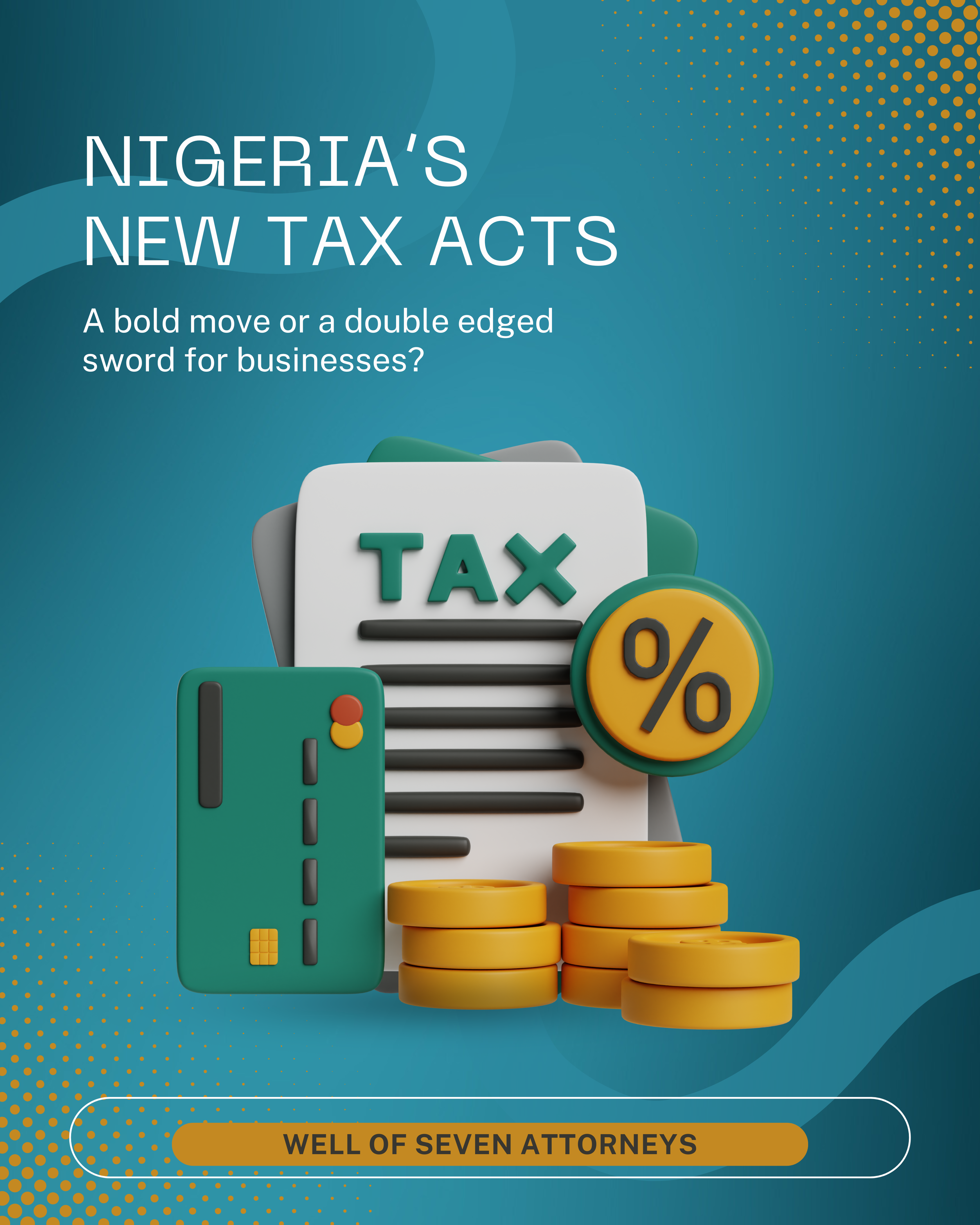On June 26, 2025, President Bola Ahmed Tinubu signed into law four tax reform bills that now form the foundation of Nigeria’s most ambitious tax overhaul in recent history:
- The Nigeria Tax Act (NTA)
- The Nigeria Tax Administration Act (NTAA)
- The Nigeria Revenue Service Act (NRSA)
- The Joint Revenue Board Act (JRBA)
Together, these Acts are a radical attempt to rewrite the tax story of Africa’s largest economy.
At Well of Seven Attorneys, we have closely examined the new tax regime. As a full-service Nigerian law firm committed to clarity, compliance, and client-centric counsel, here is our take on what this means for your business and what you must do now.
What Has Changed?
Let’s break this down into seven core areas that business owners must pay attention to:
1. Redefining Who Pays What
Small companies are defined as those with a turnover of ₦100 million or less and assets of ₦250 million or less, compared to the previous limit of ₦25 million under the repealed law. These companies are exempt from Companies Income Tax, Capital Gains Tax, and the new Development Levy.
Large companies will continue to pay 30% corporate income tax and a 4% Development Levy. This is a consolidation of multiple sector-specific levies like TETFund, NASENI, and IT Levy.
2. VAT Becomes More Transparent, But Tougher
Input VAT on services and fixed assets is now recoverable, aligning with global VAT principles. However, expenses where VAT was not charged or paid will no longer be tax deductible. This standard requires businesses to verify their suppliers or incur additional costs. Additionally, while VAT remains at 7.5%, zero-rating has been expanded to include essentials such as food, healthcare, education, residential rent, and exports.
3. The End of “Tax Holiday as Usual”
The popular Pioneer Status Incentive (PSI) has been retired. In its place is the Economic Development Incentive (EDI): a performance-based regime granting 5% annual tax credit on capital expenditure in select priority sectors, renewable every five years and contingent on active investment.
Note that the new incentive regime comes with tighter record-keeping requirements, stricter timelines, and mandatory audits.
4. Effective Tax Rate (ETR) Floors Are Now Law
Nigerian companies with a turnover of ≥ ₦50 billion or part of MNE groups with global turnover ≥ €750 million are required to pay a minimum ETR of 15%, failing which a “top-up” tax applies. In essence, no more shifting profits abroad to escape tax.
5. Personal Income Tax: More Progressive, More Penalties
Individuals earning less than ₦800,000 annually are now exempt, while top earners will face tax rates up to 25%. Also, new penalties of up to ₦5 million now apply for failures such as contracting unregistered vendors or obstructing tax technology deployments.
6. Digital Assets, Free Zones, and Stamp Duty Get a Makeover
For the first time, gains from digital asset transactions (crypto, NFTs, etc.) are explicitly taxable.
Free Zone companies lose their blanket immunity: any sales to the Nigerian customs territory beyond 25% of turnover attract tax, and from 2028, full taxation applies.
Stamp duty obligations now rest clearly on the party benefiting from the transaction.
7. A New Era of Tax Surveillance
Expect mandatory e-invoicing, VAT fiscalisation tools, and digital reporting systems, especially for businesses.
The Tax Ombudsman and Appeals Tribunal have now been introduced for oversight and as a mediator between taxpayers and authorities.
Non-residents and multinational entities now face expanded tax exposure under the “force of attraction” and Controlled Foreign Company (CFC) rules.
Our Position at Well of Seven Attorneys
The intent behind the reforms is clear: simplify, consolidate, and digitize Nigeria’s tax architecture to increase compliance and revenue. But like every major shift, it comes with risks, especially for unprepared businesses.
While we commend the clarity the NTA offers, several grey areas remain:
- The new rent relief for individuals feels out of touch with economic realities.
- The limited relief under the EDI compared to the PSI may discourage capital investment.
- The three-month transition window is too short to prevent compliance pitfalls and system overhauls.
What Should You Do Now?
Here’s our counsel to forward-thinking business leaders:
- Review your current tax profile: Are you still “small” under the new definition? Is your fixed asset threshold compliant?
- Audit your VAT process and vendor contracts: If VAT is not charged, you bear the cost.
- Reassess your tax incentives: If you were relying on PSI, it’s time to recalibrate your investment strategy under the EDI framework.
- Engage your legal and tax advisers now, not later. A storm is easier to manage when you’re not already in it.
In conclusion, Nigeria’s new tax regime is not just a policy change; it’s a shift in mindset. One that demands strategy, structure, and swift adaptation.
At Well of Seven Attorneys, we’re ready to walk this path with you. Whether you’re a small business seeking exemptions or a multinational trying to align with the new ETR rules, we’ll help you navigate the complexities with precision and clarity.
Let’s not just comply. Let’s convert compliance into competitive advantage.

